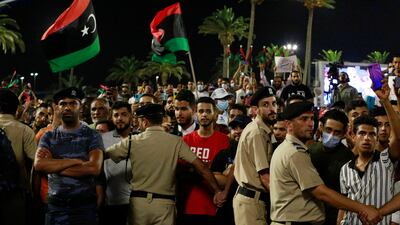Libya's parliament has started the process of replacing the interim prime minister Abdul Hamid Dbeibah, holding hearings to vet candidates in an exercise that could cause a power struggle in the already tumultuous country.
Powerful former interior minister Fathi Bashagha, 59, and outsider Khaled Al Bibass, 51, a former official in the interior ministry, will face a parliamentary vote on Thursday.
The interim government headed by Mr Dbeibah was put in place only a year ago, tasked with steering the nation to long-awaited elections and moving it away from a decade of conflict and chaos.
Libya however has not yet held the elections. Deep divisions and the introduction of disputed candidates led to the postponement of voting and Parliament Speaker Aguila Saleh has led efforts to have Mr Dbeibah replaced.
The interim prime minister has said he will only hand over power to an elected administration.
The House of Representatives led by Mr Saleh, based in eastern Libya since a violent schism in 2014, said two out of seven candidates had made it through to the final round.
Mr Bashagha told the assembly that he wanted to unify state institutions, improve security and revive the country's dismal public services. He also promised not to seek re-election.
Mr Al Bibass said he would work to overcome the country's divisions and fight inflation.
Libya has experienced a decade of conflict since the 2011 uprising that toppled former dictator Muammar Qaddafi, leaving a patchwork of militias vying for control over an oil-rich country riven by deep tribal and regional divisions.
Thursday's vote could result in a repeat of a 2014 schism, in which two parallel governments emerged.
The parliament also adopted a “road map” towards elections, which looks set to delay the polls further.
The plan says voting must take place within 14 months of an agreement on another divisive issue — a new constitution.
Qaddafi scrapped Libya's last constitution when he seized power in 1969.
The assembly is not united, and some members have called for Mr Dbeibah to stay in office until elections are held.
The UN has also called for a new date to be set for presidential polls rather than yet another transitional government.

